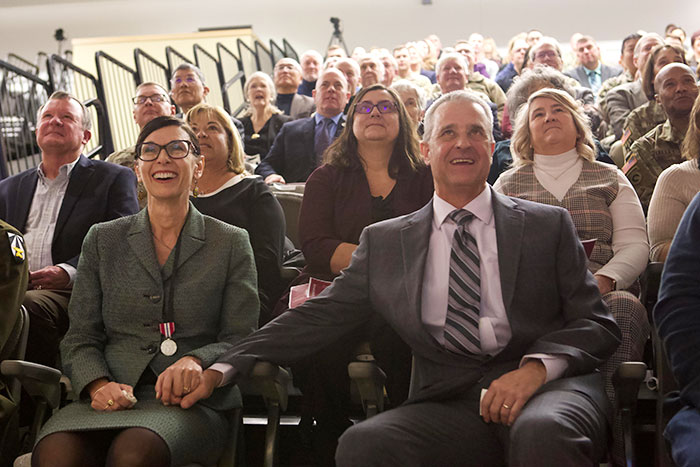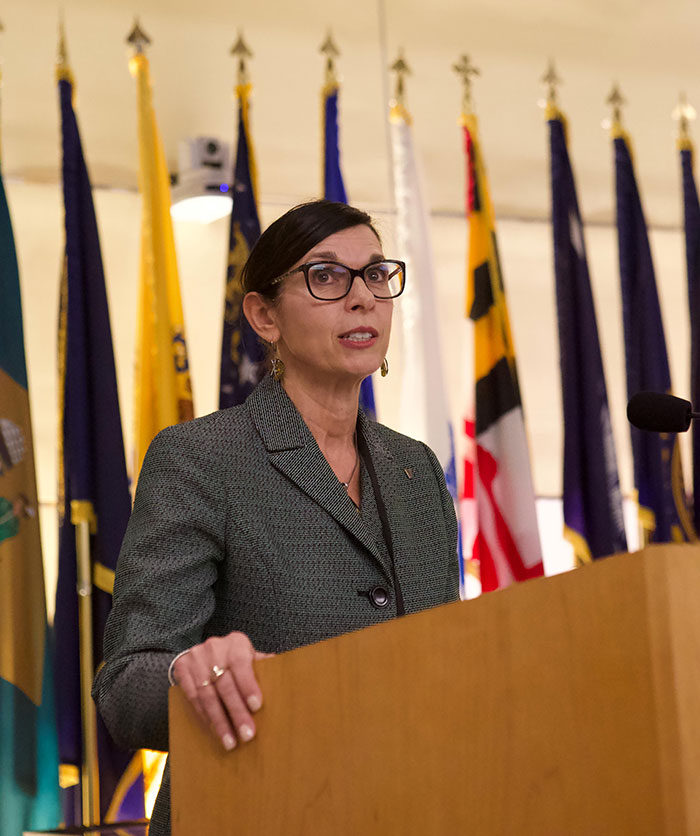MRDC Bids Farewell to Dawn Rosarius after Three Decades of Service

Last week's retirement ceremony for Principal Assistant for Acquisition Dawn L. Rosarius was a celebration of three decades of accomplishments in military medical acquisition that have contributed significantly to improving the health and safety of the Warfighter.
Brig. Gen. Edward H. Bailey, commanding general of U.S. Army Medical Research and Development Command served as the host and presiding officer of the ceremony, which took place Jan. 10 at Fort Detrick, where Rosarius had worked her entire career. Over 260 people attended the ceremony, with more tuning in via Teams. In addition to family and friends, the guests attending the ceremony included many senior military and civilian leaders in military medicine.
"Dawn is a true medical research and development command legacy – a subject matter expert for our entire product line, from science and technology to development and to fielding," said Bailey. "Throughout the decades, her roles and responsibilities may have changed, however in every position there was a common thread and that was her dedication to the Warfighter."
As just one example of that dedication, Bailey recalled how, as director of the U.S. Army Medical Materiel Agency's Materiel Acquisition Directorate, Rosarius played an instrumental role in the development of the Theater Enterprise-Wide Logistics System for the procurement and fielding of medical equipment sets, which she and her team used to oversee the readiness of medical units in Operation Iraqi Freedom. Bailey noted that the procurement system is still in use today.
Over the course of her career, Rosarius' name has become synonymous with military medical acquisition. Bailey commended her willingness to take advantage of the Army's training opportunities that opened a career path to acquisitions administration. This step allowed her to be named Acquisition Career Management Advocate for the Army medical acquisition workforce, a position in which she served until last year. As the command's civilian deputy to the Principal Assistant for Acquisition, Rosarius played a key role in securing an Emergency Use Authorization for French freeze-dried plasma and FDA approval for the laboratory assay for traumatic brain injury.

"These lifesaving solutions improve outcomes on today's battlefield by protecting Warfighters from blood loss and evaluating head trauma near the point of injury," Bailey said.
In 2019, Rosarius became PAA and was MRDC's first female member of the Senior Executive Service. In that role, she was responsible for the planning, programing, budgeting and execution of all Army medical materiel acquisition, which involved strategic oversight and coordination of more than $2.13 billion dollars of medical development and procurement requirements for the Department of Defense, the Defense Health Agency and the Army. Among her most significant accomplishments was the fielding of the Analyzer TBI, which allows medics to test for TBI indicators closer to the point of injury, enabling earlier treatment.
Rosarius also oversaw major shifts in the command's organization – first, its redesignation from the Medical Research and Materiel Command to the Medical Research and Development Command and then its transition from Army Medical Command to Army Medical Command and then to Army Futures Command, and the beginnings of its transition to the DHA. A little over a year into her tenure, she also oversaw MRDC's response to the coronavirus pandemic.
Col. James Nuce, commander of the U.S. Army Medical Materiel Development Activity, recalled how, as a young officer in 1999, he requested and received valuable assistance from Rosarius and her team at the Materiel Acquisition Directorate to help provide medical equipment in support of training and drug interdiction operations in Honduras. He said the experience made a lasting impression on him.

"Your leadership as Principal Assistant for Acquisition developed and delivered capabilities for our Army of 2030 and 2040, not just in the obvious program management activities and support of the advanced development, but as well by your leadership and mentorship to help professionally develop teammates from across the spectrum," Nuce said.
In her remarks, Rosarius emphasized her gratitude for the opportunity to dedicate her career to protecting the health of Service Members. "Most of the program managers in this room are dedicated to the military medical and health side of program management, and we chose medical because we have a passion for helping others," Rosarius said. "I am inspired daily by these professionals; you truly are the unsung heroes. You develop, integrate, select, test and field the best medical and health solutions. I will never forget what you taught me; your wisdom will stay with me always."
Rosarius thanked her colleagues in attendance for their dedication to the Warfighter. "Without you, there is no operational medicine," she said.
In her remarks, Rosarius spotlighted her top ten proudest moments and highlights of her tenure. These included her participation in the Fort Detrick Fun Runs, the inspirational people she met and worked with, the leaders who coached and mentored her and the colleagues who sought her mentorship, and the development, approval, procurement and fielding crucial medicines and medical products such as malaria drugs and an Emergency Use Authorization for French freeze-dried plasma.
"I think you know we are all here for a greater purpose, a noble mission," Rosarius said. "I encourage you to be grateful for all that you have. Thank those around you, lead positively and kindly, support each other and embrace the opportunities that are ahead."
Rosarius concluded her remarks with a favorite quote, often attributed to Dr. Seuss: "Don't cry because it's over; smile because it happened."














